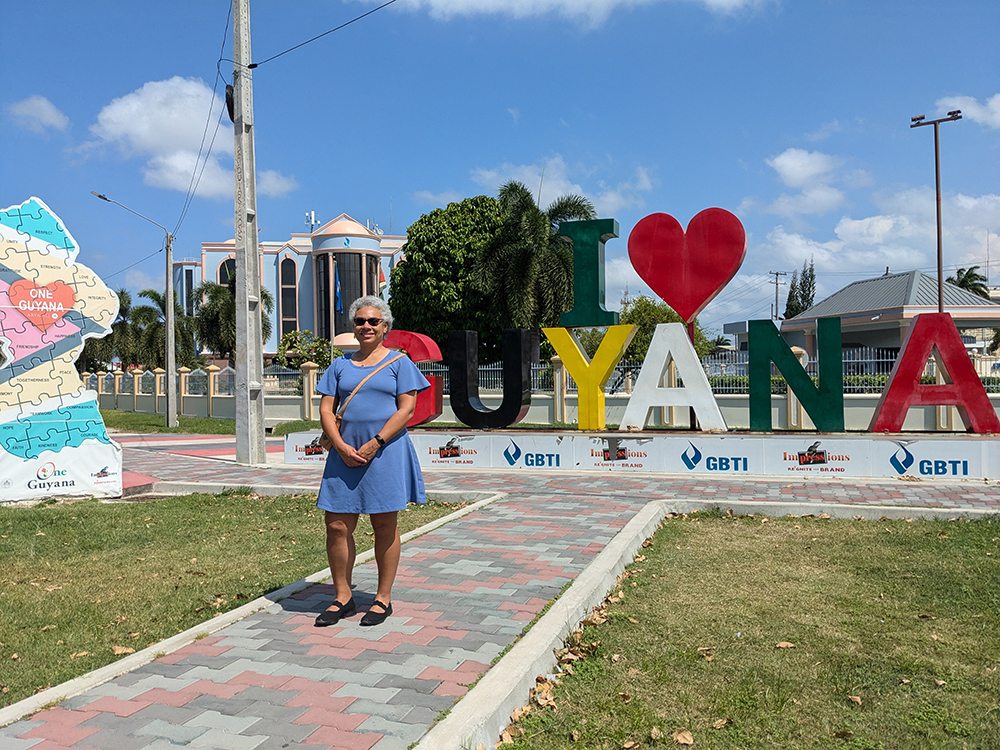Earlier this year, the U.S. Department of State and the Fulbright Foreign Scholarship Board selected Bioengineering Professor of Instruction Dr. Ruth Ochia for a Fulbright Specialist Program Award to complete a project in the engineering education field at the University of Guyana, aiming to exchange knowledge and establish beneficial partnerships.
Established in 2001 by the U.S. Department of State, Bureau of Educational and Cultural affairs, the Fulbright Specialist Program brings together U.S. professionals with institutions around the world to facilitate the sharing of knowledge and expertise across cultures, per the Fulbright Program website. As a prestigious, globally recognized program, individuals must be selected and approved to participate.
After learning she was selected, Ochia traveled to South America, in September, for a two-week long program, sharing her knowledge with University of Guyana representatives as they seek to attain accreditation for their engineering programs.
ABET, formally known as The Accreditation Board for Engineering and Technology, accredits STEM programs at colleges and universities around the world, including the College of Engineering at Temple University. The organization sets globally agreed upon, measurable educational and professional standards for STEM programs, and ensures its accredited schools continue to uphold those standards. A degree from an ABET-accredited institution is often a requirement by many employers and for future professional licensure in a technical profession.
Ochia elaborates on a simplified version of accreditation, stating, “accreditation in engineering is basically saying that your students meet a minimum standard and that you are showing to everyone, employers, prospective students, other universities, saying, ‘we are expecting our students to meet this standard.’”
With a passion for engineering education and currently serving as a Bioengineering Program Evaluator and Commissioner for the Engineering Accreditation Commission at ABET, working with University of Guyana was the perfect fit for Ochia.
Due to Guyana’s fast-growing economy, many companies are moving into the country and hiring any engineer they can find. The University of Guyana wanted to act quickly and ensure that they set themselves and their graduates apart with ABET-accredited programs.
With much to cover in two weeks, Ochia quickly got to work touring the facilities, meeting with faculty and graduates, and facilitating conversations among the faculty and administration surrounding the accreditation process, all while continuing to teach her classes virtually.
She made recommendations for best practices their lab facilities should follow to meet accreditation standards. For example, students should wear closed-toe shoes and no food or drinks in the lab. Ochia also provided insight as to what ABET officials would look for on a site visit, such as proper signage for lab safety, making fire extinguishers available in case of emergency, etc. The programs at University of Guyana will need to take into consideration the standards and codes for engineering in Guyana as they develop their curricula and laboratories.
In addition to abiding by best practices, Ochia identified issues that need to be addressed at a program level. Currently, the University graduates students with an associate degree after completing their first two years, with students applying back into the program to complete their last two years, if they chose to complete their bachelor's degrees. ABET only provides accreditation to four-year programs, making that a key issue that needs to be addressed.
While she provided her expertise in the accreditation area, Ochia learned equally as much from her time in Guyana, with this being her first site visit outside of the United States.
For example, some hurdles for University to Guyana to overcome were outside of their control. Due to rolling blackouts and a nearby construction project, the engineering building was operating on generators and sometimes didn’t have power at all.
She was prompted to consider the different circumstances that other countries and cultures face when attempting to meet “best practices.” Ochia noticed the importance of “really trying to understand where they are and understand their conditions” is key to providing solutions in any aspect of engineering. Her role was to ensure that the faculty understood that their facilities meet the standards and codes for Guyana, not the United States, as these can differ between countries. She also suggested that the faculty emphasize these potential differences to the future ABET evaluation team when they come to do a site visit.
Another example of these differences can be found in something as simple as the weather. She noted that many of their labs, classes, and office spaces had no air-conditioning and used windows for ventilation. “In the United States we wouldn’t have open labs because our seasons are different. For them, it’s hot and humid for a large portion of the year,” she elaborates.
Typically, she starts her work in the ABET process at the end, evaluating a program’s efforts and participating as part of the process to determine if they are approved for accreditation. At University of Guyana, she saw what the process looked like at the beginning, which she believes will only strengthen her understanding of the overall accreditation process.
She looks forward to building upon her two-week Fulbright experience with her continued research in engineering education. She is currently working with College of Education and Human Development Professor Avi Kaplan on an NSF grant focused on education psychology research and plans to apply her newly gained knowledge to aid the College of Engineering’s accreditation process.
“We just went through the accreditation cycle and just got re-accredited...now we’re starting our next cycle, which is the time to really look at everything. What can we do better? Are there issues? Really looking at the curriculum and potentially making changes,” she explains.
Ochia’s dedication to engineering education ensures the College of Engineering and their curriculum remains at the forefront of the ever-changing STEM field, setting up current and future students for success in their careers.

